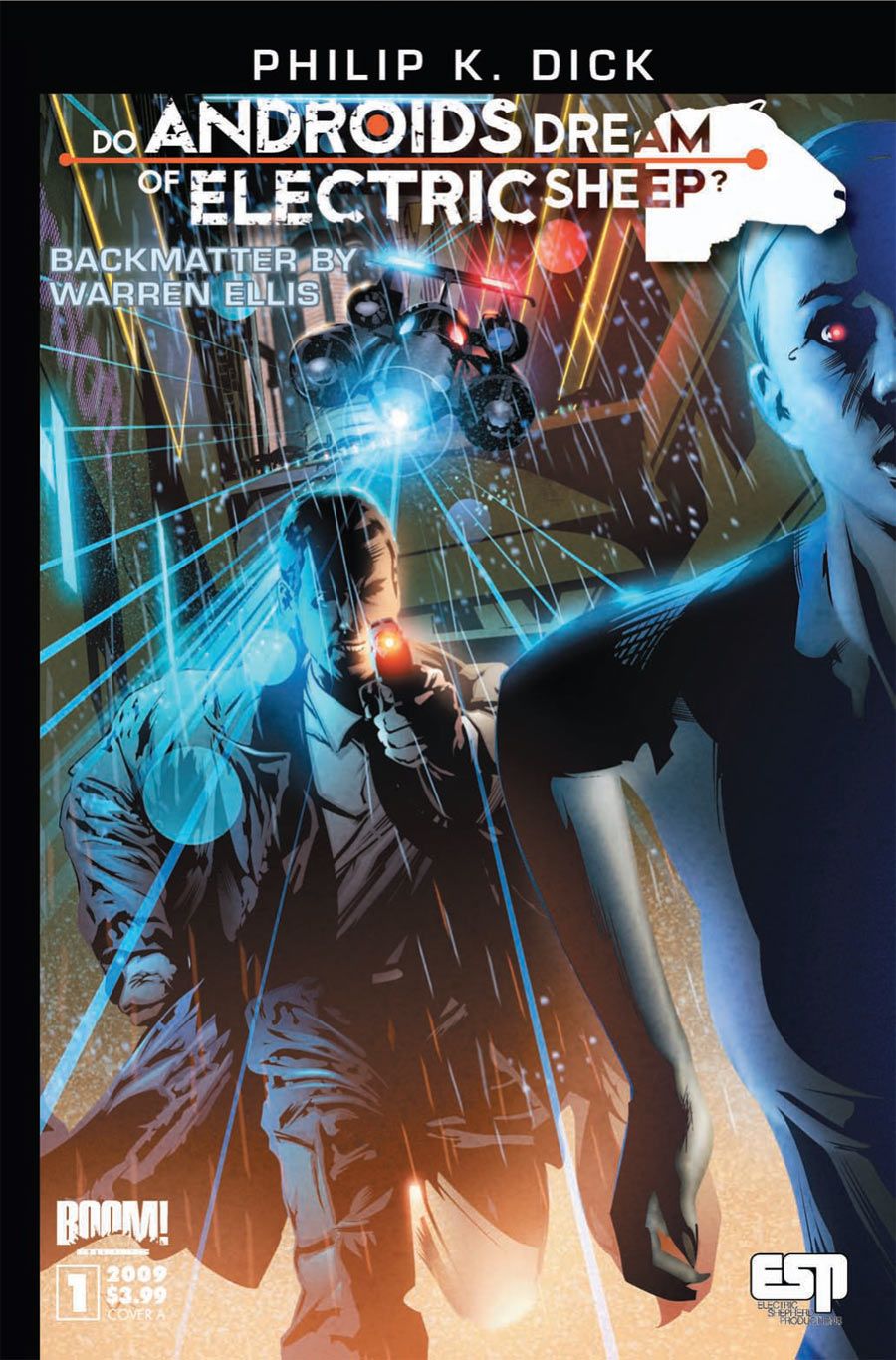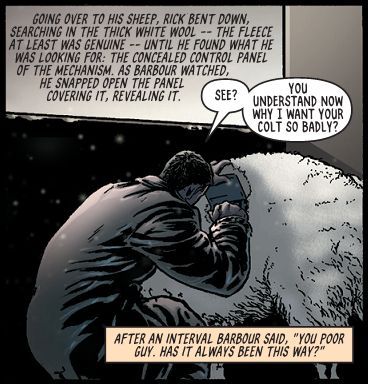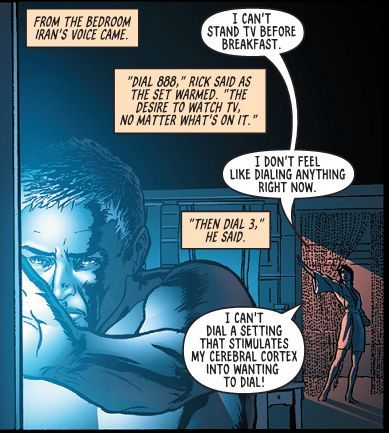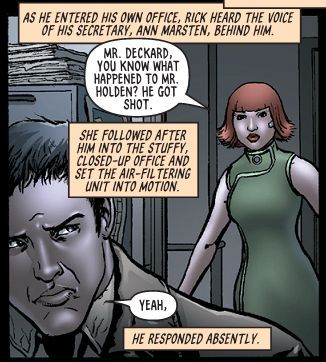Charming chap Chip Mosher has provided a preview PDF of Boom! Studios' Do Androids Dream of Electric Sheep? #1, available in finer comic shops this Wednesday, and I'm gonna review it! As an opening page states, "This series is the complete text of Philip K. Dick's Do Androids Dream of Electric Sheep?, presented in graphic form." So how does the intriguing experiment of comic book translation fare?
I've never read a Philip K. Dick novel before, but I've wanted to for years. They just seem hard to come by, especially for a reasonable price-- but then, I do all my book-buying at libraries for dirt cheap prices, so my definition of "reasonable" is certainly different from others'. But hey-- free's reasonable! So I checked this out.
What we have here is not an adaptation of the novel, such as with Darwyn Cooke's upcoming Parker graphic novel-- no, this comic is a word-for-word transcription of Dick's original novel, broken up into captions and word balloons, laid out as a regular comic, panel by panel. Dialogue balloons are joined by "he said" captions, and prose fills the page. It ends up as a comic that's wordier than Chris Claremont on truth serum.
So what about the story? Well, it's kinda weird "reviewing" a 41 year old, celebrated science fiction classic, but I'll give it a go. Rick Deckard and his wife live in a post-nuke kind of world where radioactive fallout is a fact of life and men walk around with lead codpieces so that they don't go "special." Cities are sparsely populated, losing much of their population to space colony emigration. Those left care for live animals, doing their part to keep various species going. Deckard's embarassed that his pet sheep died, so he's replaced it with an electric one, hoping no one will notice. Also, he hunts androids. And there's another fella, name of John Isidore, suffering brain damage from nuclear fallout and living a life dictated by the television, and some kind of Sisyphean religion called Mercerism. That section lost me a bit through the density of the prose, and I don't quite "get" the Mercer stuff, but I'm presuming more will be revealed later. Or perhaps I'm as dumb as Burgas seems to think he is.
So yeah, the story intrigues me. It's vastly different from Blade Runner, and as far as I'm concerned, that's a good thing. I know Blade Runner is highly touted, but I found it hopelessly boring. While the world of Blade Runner seemed incredibly population-dense, the book instead depicts an empty, abandoned world; those still around are equally abandoned, or forced to stay due to work commitments, or perhaps poverty. My favorite aspect of the work is how humans let technology run their lives, to the point where they "dial in" emotions off personal computers rather than go through the trouble of having their own emotions. Deckard and his wife argue ov
er her dialing choices-- she's found something of a catharsis in despair, and he doesn't like it. He's all about dialing in his "businesslike professional attitude," but one can see that he doesn't appear to want that; he's depressed and wistful over his damn sheep. It reminds me of Greg Feely from Grant Morrison's Filth series-- all Greg wanted to do was take care of his cat; the sci-fi madness around him could go to hell.
The art, by Tony Parker-- who, I'm presuming, is not Mr. Eva Longoria-- looks just fine. That's about the highest praise I think the art's going to get. It's perfectly capable, generic art, with a few spots of intriguing interpretation, such as when the scary, oppressive room grows large and looms menacingly over Deckard's wife, Evil Dead II-style. Mostly, it seems like it's there to hold the story's hand as it goes along, though as this issue suffers from an awful lot of set-up and exposition, the art doesn't get a chance to shine. It's also in the little things-- a panel where a book cover is on backwards, a character's nightgown not corresponding to the given prose. But I'm wondering-- who exactly is determining what happens in the panels, and how the prose is paced throughout an issue? Is it artist Tony Parker? Is it editor, and former star blogger, Ian Brill?
My favorite part of the issue is definitely the backmatter from Warren Ellis. It's reason enough to buy this comic, in fact! Ellis writes a marvelous essay, drawing comparisons between Philip K. Dick's life and the world inside this particular novel-- the clearly disturbed but brilliant writer and a vision of society that's becoming more real every day. I also deeply respect the page asking readers to contribute to a fund that cares for Paul Williams, friend of PKD's and literary executor of his estate, who suffers from a traumatic brain injury and the need for full-time care.
But now, let's turn back to the nature of "reasonable price." From what I understand, this series plans to run 24 issues-- multiply that by the four dollars each issue costs, and you're spending around 100 Yankee dollars on the series. Is this cost worth it? Sure, you've got the backmatter from renowned personalities, and the solid art to help you along, but you can buy the novel itself on Amazon for only 11 bucks. Wouldn't that be a wiser investment? Probably. But one imagines those purchasing this comics series fall into certain audience subcategories.
There are comic readers, like me, who have never read a Philip K. Dick book and are seizing the opportunity now. I can see it working for them, especially if they're the type of folks who prefer comics to those lame books that come without any pictures. Or maybe they really liked Blade Runner and want to see something similar-- they might be disappointed, but the source material is clearly better. Blade Runner literally put me to sleep. Or maybe the book would be best marketed toward hardcore Philip K. Dick fans who have read all four dozen or so of his novels and own all his movie adaptations on DVD, even the eighteen-disc uber-version of Blade Runner. Lord knows I've got six or seven variations of the Hitchhiker's Guide to the Galaxy puttering around the house. Those interested in seeing how one of their favorite novels transplants to another medium, like a kidney given to you by your favorite uncle, will probably enjoy the hell out of it no matter what. After all, it's exactly the same as their favorite book, only with pictures. And roughly ten times the price tag.
Ahh, but-- yes! I know the perfect audience for this comic book. If you're the type that complains four bucks is too much to spend on a comic that takes three minutes to read, then here you are! It's the comic you've been waiting for.
Like I said above the fold, Boom! Studios' Do Androids Dream of Electric Sheep? is an intriguing experiment, and I'll be watching to see if any other "adaptations" like this one spring up. Like the titular androids, it's just like the novel, only different. The text has been interpreted for you. All that pesky imagining is cut out of the equation. The story, however, stands as firm as ever.
Anyway, Chad Nevett gave it four stars, so you should probably just listen to him. What the hell do I know? I tried to dial for "comic reviewer" and got a busy signal.





